语言学第一章补充教案
语言学概论(教案)
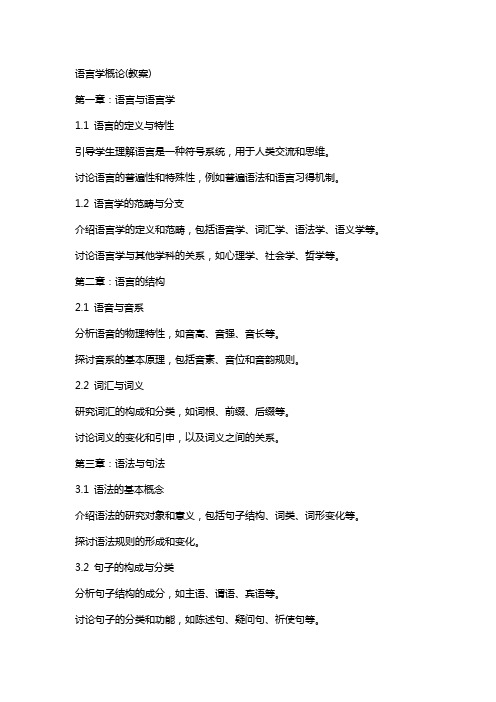
语言学概论(教案)第一章:语言与语言学1.1 语言的定义与特性引导学生理解语言是一种符号系统,用于人类交流和思维。
讨论语言的普遍性和特殊性,例如普遍语法和语言习得机制。
1.2 语言学的范畴与分支介绍语言学的定义和范畴,包括语音学、词汇学、语法学、语义学等。
讨论语言学与其他学科的关系,如心理学、社会学、哲学等。
第二章:语言的结构2.1 语音与音系分析语音的物理特性,如音高、音强、音长等。
探讨音系的基本原理,包括音素、音位和音韵规则。
2.2 词汇与词义研究词汇的构成和分类,如词根、前缀、后缀等。
讨论词义的变化和引申,以及词义之间的关系。
第三章:语法与句法3.1 语法的基本概念介绍语法的研究对象和意义,包括句子结构、词类、词形变化等。
探讨语法规则的形成和变化。
3.2 句子的构成与分类分析句子结构的成分,如主语、谓语、宾语等。
讨论句子的分类和功能,如陈述句、疑问句、祈使句等。
第四章:语义与语用4.1 语义学的基本原理介绍语义学的定义和研究方法,包括词汇语义学和句子语义学。
探讨语义的成分分析和意义之间的关系。
4.2 语用的基本概念讨论语用的定义和范畴,包括语境、语用含义、言语行为等。
分析语用在实际交际中的应用和作用。
第五章:语言的变异与变化5.1 语言的变异现象探讨语言的变异形式,包括方言、俚语、行话等。
分析语言变异的原因和影响。
5.2 语言的变化与演变研究语言的变化过程和规律,包括语音变化、词汇变化、语法变化等。
探讨语言演变的原因和社会因素对语言变化的影响。
第六章:语言的接触与影响6.1 语言的接触形式分析语言接触的类型,如双语、多语、语言借用等。
探讨语言接触的原因和结果,以及接触语言对个体和社会的影响。
6.2 语言的扩散与传播研究语言扩散的过程和模式,如语言的传播、语言的替换和语言的消亡。
分析语言扩散的社会经济和文化因素。
第七章:语言的记录与描写7.1 语言记录的方法和技术介绍语言记录的基本方法,如语音记录、文字记录和计算机记录。
《语言学概论》教案

《语言学概论》教案第一章:语言与语言学1.1 教学目标了解语言的定义和特性掌握语言学的基本概念和研究对象理解语言学的重要性和应用领域1.2 教学内容语言的定义和特性:语言是一种符号系统,用于表达和交流思想与信息。
语言学的基本概念:语言学是研究语言的科学,包括语音学、语法学、词汇学等分支。
语言学的研究对象:语言的结构、功能、历史和发展等方面。
语言学的重要性和应用领域:语言学在教育、翻译、语言政策等领域具有重要作用。
1.3 教学活动引入讨论:让学生分享对语言的理解和认知。
小组讨论:让学生探讨语言的符号特性和语言学的研究方法。
案例分析:分析实际语言使用中的例子,让学生理解语言学的应用。
小组展示:让学生选择一个语言学分支,进行小组展示并分享其研究对象和重要性。
1.4 作业与评估完成课后阅读材料:让学生阅读相关文献,加深对语言和语言学的理解。
写一篇短文:让学生选择一个语言学分支,对其研究对象和重要性进行阐述。
参与小组讨论和展示:评估学生在小组讨论和展示中的参与度和表现。
第二章:语言的结构2.1 教学目标了解语言的结构组成掌握语音、词汇、语法的基本概念和关系理解语言结构的特点和重要性2.2 教学内容语音:语音是语言的最小单位,包括元音、辅音、声调等。
词汇:词汇是语言的建筑材料,包括实词和虚词。
语法:语法是语言的规则体系,包括词法和句法。
语言结构的特点和重要性:语言结构的规律性和可变性对语言的交际功能和表达效果具有重要意义。
2.3 教学活动语音实验:让学生通过语音实验感知和区分不同的语音特征。
词汇游戏:让学生通过词汇游戏理解和记忆单词的用法和意义。
语法练习:让学生通过语法练习掌握句法规则和语法结构。
小组讨论:让学生探讨语言结构对语言交际功能的影响。
2.4 作业与评估语音练习:让学生进行语音练习,提高对语音特征的辨识能力。
词汇练习:让学生进行词汇练习,加深对单词用法和意义的学习。
语法练习:让学生进行语法练习,巩固句法规则和语法结构的知识。
语言学概论(教案)

语言学概论(教案)第一章:语言与语言学1.1 语言的定义与特征介绍语言的定义,如符号系统、交际工具、心理现象等。
讨论语言与方言、口语与书面语的区别。
探讨语言的生理与心理基础。
1.2 语言学的学科定位与研究方法解释语言学的定义,探讨其与其他学科的关系。
介绍语言学的研究方法,如实证研究、比较研究、历史研究等。
1.3 语言学的历史发展概述语言学的历史,从古代的语言研究到现代的语言学流派。
介绍重要的语言学家及其理论贡献。
第二章:语音与音系2.1 语音的物理与生理基础讨论语音的定义,解释语音的物理特性,如音高、音长、音强等。
探讨语音的生理产生机制。
2.2 音素的分类与特征介绍音素的定义与分类,如元音、辅音、声调等。
讨论音素的特征,如语音的声学特性、语音的语音学特征等。
2.3 音系与音位解释音系的定义,探讨音系与音位的区别。
讨论音系的特点,如音位的对立、音位的分布等。
第三章:词汇与词义3.1 词汇的定义与分类介绍词汇的定义,如词语的集合、语言的建筑材料等。
概述词汇的分类,如名词、动词、形容词等。
3.2 词义的性质与分类讨论词义的定义,解释词义的性质,如抽象性、具体性等。
概述词义的分类,如本义、转义、比喻义等。
3.3 词义的关系与变化解释词义的关系,如同义关系、反义关系等。
探讨词义的变化原因,如语言的演变、社会文化的影响等。
第四章:语法与句法4.1 语法的定义与分类介绍语法的定义,解释语法的作用与重要性。
概述语法的分类,如形态语法、句法语法等。
4.2 句法的结构与功能解释句法的定义,探讨句法的结构与功能。
讨论句法的基本单位,如句子、短语等。
4.3 句法的变化与演变探讨句法的变化原因,如语言的演变、社会文化的影响等。
概述句法的演变过程,如句法的创新与消亡等。
第五章:语用与语境5.1 语用的定义与分类介绍语用的定义,解释语用的作用与重要性。
概述语用的分类,如语用学中的主要研究领域,如言语行为、语用含义等。
5.2 语境的定义与作用解释语境的定义,探讨语境的作用与重要性。
《语言学概论》教案
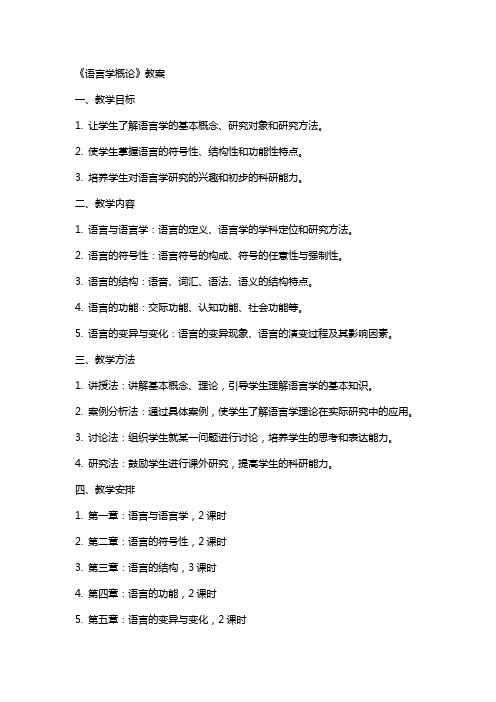
《语言学概论》教案一、教学目标1. 让学生了解语言学的基本概念、研究对象和研究方法。
2. 使学生掌握语言的符号性、结构性和功能性特点。
3. 培养学生对语言学研究的兴趣和初步的科研能力。
二、教学内容1. 语言与语言学:语言的定义、语言学的学科定位和研究方法。
2. 语言的符号性:语言符号的构成、符号的任意性与强制性。
3. 语言的结构:语音、词汇、语法、语义的结构特点。
4. 语言的功能:交际功能、认知功能、社会功能等。
5. 语言的变异与变化:语言的变异现象、语言的演变过程及其影响因素。
三、教学方法1. 讲授法:讲解基本概念、理论,引导学生理解语言学的基本知识。
2. 案例分析法:通过具体案例,使学生了解语言学理论在实际研究中的应用。
3. 讨论法:组织学生就某一问题进行讨论,培养学生的思考和表达能力。
4. 研究法:鼓励学生进行课外研究,提高学生的科研能力。
四、教学安排1. 第一章:语言与语言学,2课时2. 第二章:语言的符号性,2课时3. 第三章:语言的结构,3课时4. 第四章:语言的功能,2课时5. 第五章:语言的变异与变化,2课时五、教学评价1. 平时成绩:课堂参与、讨论、作业等,占30%。
2. 期中考试:测试语言学基本概念和理论,占30%。
六、教学内容6. 语言的接触与融合:语言接触的现象、语言融合的过程及影响、语言转用。
7. 语言与文化:语言与文化的关系、语言的文化内涵、语言与文化传承。
8. 语言与心理:语言与思维、语言与认知、心理语言学的基本概念。
9. 语言与交际:交际过程中的语言使用、语言交际策略、非语言交际。
10. 语言学分支及其研究方法:语音学、词汇学、语法学、语义学、社会语言学等。
七、教学方法1. 比较法:通过比较不同语言的接触与融合现象,使学生深入了解语言变化的原因。
2. 文化导入法:介绍语言与文化之间的关系,引导学生理解文化对语言的影响。
3. 心理语言学实验:组织学生进行心理语言学相关的实验,培养学生的实证研究能力。
学前儿童语言学教案课件
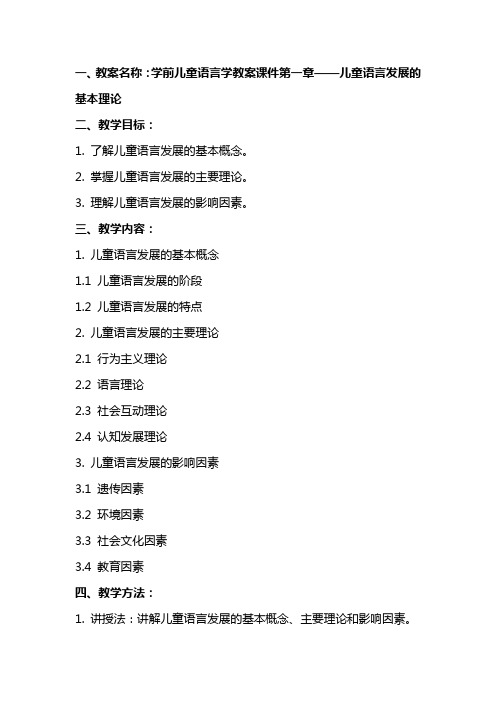
一、教案名称:学前儿童语言学教案课件第一章——儿童语言发展的基本理论二、教学目标:1. 了解儿童语言发展的基本概念。
2. 掌握儿童语言发展的主要理论。
3. 理解儿童语言发展的影响因素。
三、教学内容:1. 儿童语言发展的基本概念1.1 儿童语言发展的阶段1.2 儿童语言发展的特点2. 儿童语言发展的主要理论2.1 行为主义理论2.2 语言理论2.3 社会互动理论2.4 认知发展理论3. 儿童语言发展的影响因素3.1 遗传因素3.2 环境因素3.3 社会文化因素3.4 教育因素四、教学方法:1. 讲授法:讲解儿童语言发展的基本概念、主要理论和影响因素。
2. 案例分析法:分析具体案例,帮助学生更好地理解儿童语言发展的理论和实践。
3. 讨论法:组织学生分组讨论,分享对儿童语言发展的认识和经验。
五、教学评价:1. 平时成绩:考察学生出勤、课堂表现、作业完成情况。
2. 课堂参与度:评估学生在讨论中的表现,包括观点阐述、互动交流等。
六、教学资源:1. 教材:选用权威、实用的儿童语言学教材。
2. 课件:制作精美的多媒体课件,直观展示儿童语言发展的相关内容。
3. 案例资料:搜集相关的案例,用于分析和讨论。
七、教学安排:1. 课时:2学时2. 教学过程:2.1 导入:介绍儿童语言发展的基本概念。
2.2 讲解:讲解儿童语言发展的主要理论和影响因素。
2.3 案例分析:分析具体案例,引导学生深入理解儿童语言发展。
2.4 讨论:组织学生分组讨论,分享对儿童语言发展的认识。
2.5 总结:总结本节课的重点内容,布置课后作业。
六、教案名称:学前儿童语言学教案课件第二章——儿童语言习得过程教学目标:1. 理解儿童语言习得的基本过程。
2. 掌握儿童语言习得的关键阶段。
3. 分析影响儿童语言习得的主要因素。
教学内容:1. 儿童语言习得的基本过程1.1 语音习得1.2 词汇习得1.3 句子习得1.4 语篇习得2. 儿童语言习得的关键阶段2.1 婴儿期2.2 前期儿童阶段2.3 学龄前期2.4 学龄期3. 影响儿童语言习得的主要因素3.1 生物因素3.2 家庭因素3.3 社会文化因素3.4 教育因素教学方法:1. 讲授法:讲解儿童语言习得的基本过程、关键阶段和影响因素。
《普通语言学》教案

《普通语言学》教案第一章:引言1.1 课程介绍了解本课程的目标、内容和教学方法。
强调语言学的重要性和实际应用价值。
1.2 语言与语言学定义语言和语言学的概念。
解释语言的本质和功能。
探讨语言的起源和发展。
1.3 语言学分支介绍语言学的各个分支,如语音学、词汇学、语法学、语义学等。
解释各分支的研究对象和研究方法。
1.4 语言学与应用探讨语言学在不同领域的应用,如教育、翻译、语言技术等。
强调语言学对人类社会的重要性。
第二章:语言的本质2.1 语言与符号系统解释语言作为一种符号系统的特点。
探讨语言符号的任意性和规则性。
2.2 语言的多样性与统一性介绍不同语言之间的多样性,如语音、语法、词汇等方面的差异。
强调人类语言的统一性,如语法结构的普遍性。
2.3 语言的生物基础探讨语言与大脑的关系,了解语言处理的神经机制。
讨论语言能力与智力、遗传等因素的关系。
2.4 语言的社交功能强调语言在人类社交交流中的作用。
探讨语言的约定俗成性和社交约束力。
第三章:语音学与音系学3.1 语音学概述定义语音学的概念,介绍语音学的研究对象。
分析语音的特点,如音高、音强、音长等。
3.2 音素与音位解释音素和音位的概念,探讨它们的关系。
分析音位的分布规律和语音变化。
3.3 音系学概述定义音系学的概念,介绍音系学的研究方法。
探讨音系规则和音系对立。
3.4 语音障碍与语音治疗讨论语音障碍的原因和类型,如发音困难、语音不清等。
介绍语音治疗的方法和技术。
第四章:词汇学与语义学4.1 词汇学概述定义词汇学的概念,介绍词汇学的研究对象。
探讨词汇的分类和词汇之间的关系。
4.2 词义与语义解释词义和语义的概念,探讨它们的关系。
分析词义的分类和语义的传递。
4.3 语义学概述定义语义学的概念,介绍语义学的研究方法。
探讨语义场的构建和语义关系。
4.4 词汇与新词创造分析词汇的途径,如词缀法、合成法等。
探讨新词创造的规则和趋势。
第五章:语法学与句法学5.1 语法学概述定义语法学的概念,介绍语法学的研究对象。
语言学第一章课件
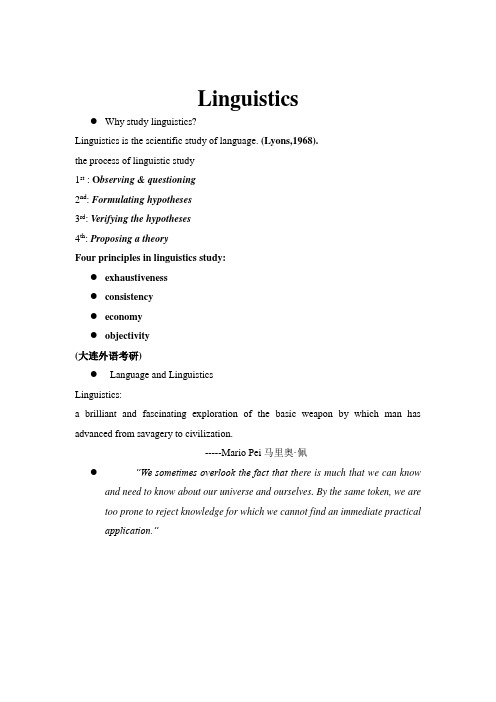
Linguistics●Why study linguistics?Linguistics is the scientific study of language. (Lyons,1968).the process of linguistic study1st : O bserving & questioning2nd: Formulating hypotheses3rd: Verifying the hypotheses4th: Proposing a theoryFour principles in linguistics study:●exhaustiveness●consistency●economy●objectivity(大连外语考研)●Language and LinguisticsLinguistics:a brilliant and fascinating exploration of the basic weapon by which man has advanced from savagery to civilization.-----Mario Pei马里奥·佩●“We sometimes overlook the fact that th ere is much that we can knowand need to know about our universe and ourselves. By the same token, we are too prone to reject knowledge for which we cannot find an immediate practical application.”Chapter 1When we study human language, we are approaching what some might call the “human essence”, the distinctive qualities of mind that are, so far as we know, unique to man. (Noam Chomsky, 1972, Language and Mind)●乔姆斯基(Noam Chomsky, 1928--)●“Chomsky is currently among the most-cited writers in all of the humanities(behind only Marx, Lenin, Shakespeare, Aristotle, Plato, and Freud) and the only living number of the top ten.” (Pinker,1994)● 1. What is Language?●Definitions of Language:Language is a system of arbitrary vocal symbols used for human communication.Key words:Language as systemSound <Phonetics发音学< Phonology 音韵学Structure <morphology 形态学<Syntax 句法学meaning <Semantics语义学<Pragmatics 语用学●Definitions of Language:●Language is a means of verbal communication.It is instrumental; it is social and conventional.(P3)2.Origin of language●The …Divine‟ origin:●The “bow-wow” theory “汪汪理论”●Imitation of the sounds of the animal●OnomatopoeicProblematic (P9)●The “pooh-pooh” theory噗噗理论●instinctive sounds of pain, anger and joy.●interjections●Problematic (P9)●The “yo-he-ho” theory“哟-嗬-哟理论”rhythmic grunts●Problematic (P9)● 3. Design Features of Language●Design features (本质特征) refer to the defining properties of human languagethat distinguish it from any animal system of communication. (P4)●Language distinguishes human beings from animals in that it is far moresophisticated than any animal communication system.● 2.Design features2.1 Arbitrariness2.2 Duality2.3 Creativity2.4 Displacement● 1. Arbitrariness●--Ferdinand de Saussure 索绪尔(Swiss)●the forms of linguistic signs bear no natural (logical, intrinsic)relationship to their meaning●At lexical level:词汇层面“A rose by any other name would smell as sweet.”---Shakespeare in Romeo and JulietCan onomatopoeia change the arbitrary nature of language?●at the syntactic level●language is not arbitrary at the syntactic level.●(a) He came in and sat down.●(b) He sat down and came in.●(c) He sat down after he came in.Arbitrariness and convention●Duality(双重性)●Duality means that language has two levels of structure, the primary leveland the secondary level.●At secondary level are elements which have no meaning but which combine toform units at primary level which do have meaning.●Secondary level is made up of meaningless sounds, and primary level ofmeaningful words.●Does the traffic light system have duality?Creativity (创造性)Recursiveness (递归性)means that one sentence can expand into endless possible sentences in a way of recurring.Displacement (移位性)●Displacement enables us to talk about a wide range of things.Unlike animal communication systems, human language is ()(电子科大2003考研)(p8)A.Stimulus freeB.Stimulus boundC.Under immediate stimulus controlD.Stimulated by some occurrence of communal interest4. Functions of language1 Informative(信息功能)2 Interpersonal function(人际功能)It embodies the use of language to express, establish and maintain social relations. The ways you talk to different people show your social status.3 Performativ e (施为功能)It means that language is also used to “do things”, to perform actions.It is primarily to change the social status of a person, or the state of a thing.4 Emotive function(感情功能)It is the use of language to reveal some feelings and attitudes of the speaker.5 Phatic communion (寒暄功能)It refers to language used for maintaining social contact rather than exchanging information or ideas.6 Recreational function (娱乐功能)It refers to the use of language for the sheer joy of using it.7. Metalingual function (元语言功能)The metalingual function is used to clarify meanings or what the other personhas said.5. Important Distinctions1 Descriptive vs. prescriptive2 Synchronic vs. diachronic3 Langue vs. parole4 Competence vs. performance1 Descriptive vs. Prescriptive (描写式和规定式)A linguistic study is descriptive if it describes and analyses facts observed; it is prescriptive if it tries to lay down rules for correct behavior.The description of a language at any one time is a synchronic study; the description of a language as it changes through time is a diachronic study.__________ studies a particular state of language;__________ studies the historical development of a language.Parole refers to the realization of langue._______: abstract_______: specific_______: stable and systematic_______: subject to personal and situational constraintsAs a social product, langue is a set of conventions that members of a speech community seem to abide by. Parole, on the other hand, is the concrete use of the conventions.Competence is the language user’s intuitive knowledge of his language.Performance is the actual realization of this knowledge in utterances.A speaker’s competence is s_____, but his performance is often influenced by p___________ factors.Where does the knowledge of language come from?Chomsky’s solution is to invoke the innate properties of the mind.What is the difference between these two pairs of distinction?Similarity:Difference:Saussure looks at language from a ___________ point of view;Chomsky looks at it more from a _____________ point of view.According to Saussure and Chomsky, which should be studied, the abstract knowledge or the actual speech?The significance of these two distinctions lies in defining the task of linguistics, which is to discover langue from instances of parole, to discover the language knowledge of the speaker from his performances.。
小班语言学本领教案
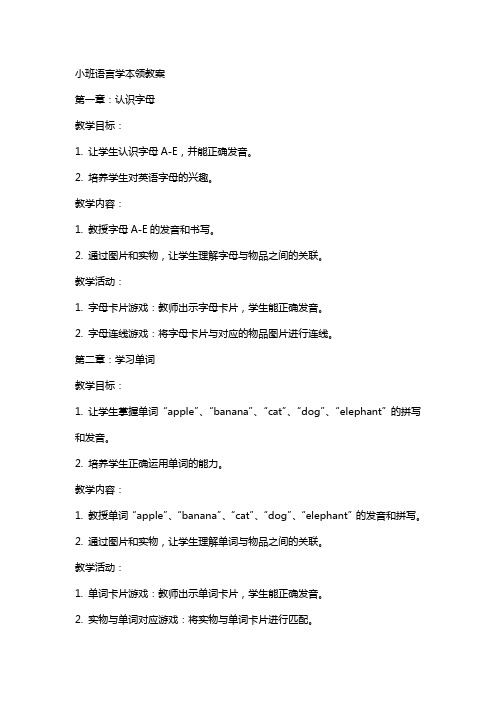
小班语言学本领教案第一章:认识字母教学目标:1. 让学生认识字母A-E,并能正确发音。
2. 培养学生对英语字母的兴趣。
教学内容:1. 教授字母A-E的发音和书写。
2. 通过图片和实物,让学生理解字母与物品之间的关联。
教学活动:1. 字母卡片游戏:教师出示字母卡片,学生能正确发音。
2. 字母连线游戏:将字母卡片与对应的物品图片进行连线。
第二章:学习单词教学目标:1. 让学生掌握单词“apple”、“banana”、“cat”、“dog”、“elephant”的拼写和发音。
2. 培养学生正确运用单词的能力。
教学内容:1. 教授单词“apple”、“banana”、“cat”、“dog”、“elephant”的发音和拼写。
2. 通过图片和实物,让学生理解单词与物品之间的关联。
教学活动:1. 单词卡片游戏:教师出示单词卡片,学生能正确发音。
2. 实物与单词对应游戏:将实物与单词卡片进行匹配。
第三章:学习简单句子教学目标:1. 让学生学会用“I like ”表达自己的喜好。
2. 培养学生简单句子的表达能力。
教学内容:1. 教授句子“I like ”的构成和用法。
2. 通过图片和实物,让学生理解句子与物品之间的关联。
教学活动:1. 句子卡片游戏:教师出示句子卡片,学生能正确发音。
2. 实物与句子对应游戏:将实物与句子卡片进行匹配。
第四章:语音辨识教学目标:1. 让学生能够辨识元音字母和辅音字母。
2. 培养学生对语音的敏感度。
教学内容:1. 教授元音字母和辅音字母的区别。
2. 通过语音练习,让学生能够正确辨识元音字母和辅音字母。
教学活动:1. 元音字母和辅音字母卡片游戏:教师出示卡片,学生能正确辨识。
2. 语音辨识游戏:播放音频,学生能正确辨别元音字母和辅音字母。
第五章:学习日常用语教学目标:1. 让学生掌握日常用语“Good morning”、“Good afternoon”、“Good evening”、“How are you?”、“Thank you”的表达。
语言学纲要教案
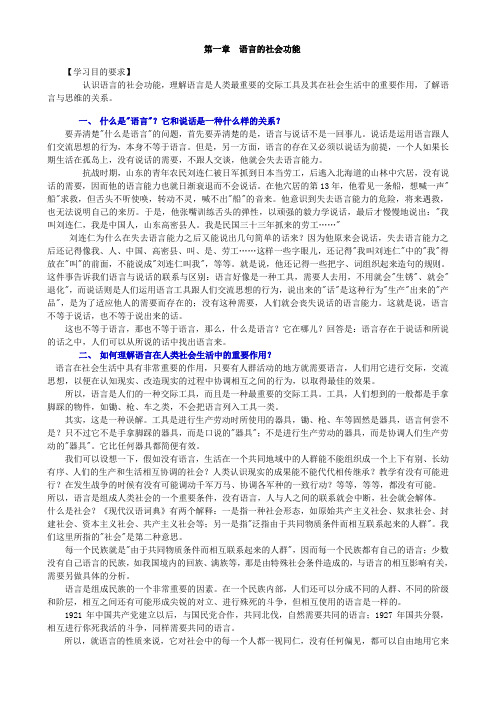
第一章语言的社会功能【学习目的要求】认识语言的社会功能,理解语言是人类最重要的交际工具及其在社会生活中的重要作用,了解语言与思维的关系。
一、什么是"语言"?它和说话是一种什么样的关系?要弄清楚"什么是语言"的问题,首先要弄清楚的是,语言与说话不是一回事儿。
说话是运用语言跟人们交流思想的行为,本身不等于语言。
但是,另一方面,语言的存在又必须以说话为前提,一个人如果长期生活在孤岛上,没有说话的需要,不跟人交谈,他就会失去语言能力。
抗战时期,山东的青年农民刘连仁被日军抓到日本当劳工,后逃入北海道的山林中穴居,没有说话的需要,因而他的语言能力也就日渐衰退而不会说话。
在他穴居的第13年,他看见一条船,想喊一声"船"求救,但舌头不听使唤,转动不灵,喊不出"船"的音来。
他意识到失去语言能力的危险,将来遇救,也无法说明自己的来历。
于是,他张嘴训练舌头的弹性,以顽强的毅力学说话,最后才慢慢地说出:"我叫刘连仁,我是中国人,山东高密县人。
我是民国三十三年抓来的劳工……"刘连仁为什么在失去语言能力之后又能说出几句简单的话来?因为他原来会说话,失去语言能力之后还记得像我、人、中国、高密县、叫、是、劳工……这样一些字眼儿,还记得"我叫刘连仁"中的"我"得放在"叫"的前面,不能说成"刘连仁叫我",等等。
就是说,他还记得一些把字、词组织起来造句的规则。
这件事告诉我们语言与说话的联系与区别:语言好像是一种工具,需要人去用,不用就会"生锈"、就会"退化",而说话则是人们运用语言工具跟人们交流思想的行为,说出来的"话"是这种行为"生产"出来的"产品",是为了适应他人的需要而存在的;没有这种需要,人们就会丧失说话的语言能力。
2009语言学教案

Chapter 1 Invitations to LinguisticsTeaching aims: let the students have the general idea about language and linguistics.Teaching difficulties: design features of language ; some important distinctions in linguistics Teaching proceduresnguage1.1Why study language?A tool for communicationAn integral part of our life and humanityIf we are not fully aware of the nature and mechanism of our language, we will be ignorant of what constitutes our essential humanity.1.2What is language?different senses of languagewhat a person says( concrete act of speech)a person‘s consistent way of speaking or writinga particular level of speaking or writinge.g. colloquial languagean abstract systemdefinitionsL a n g u a g e i s a m e a n s o f v e r b a l c o m m u n i c a t i o n.I t i s i n s t r u m e n t a l i n t h a t c o m m u n i c a t i n g b y s p e a k i n g o r w r i t i n g i s a p u r p o s e f u l a c t.I t i s s o c i a l a n d c o n v e n t i o n a l i n t h a t l a n g u a g e i s a s o c i a l s e m i o t i c a n d c o m m u n i c a t i o n c a n o n l y t a k e p l a c e e f f e c t i v e l y i f a l l t h e u s e r s s h a r e a b r o a d u n d e r s t a n d i n g o f h u m a n i n t e r a c t i o n i n c l u d i n g s u c h a s s o c i a t e d f a c t o r s a s n o n v e r b a l c u e s,m o t i v a t i o n,a n d s o c i o-c u l t u r a l r o l e s.What is communication?-- A process in which information is transmitted from a source (sender or speaker) to a goal (receiver or listener).1.3 Design features of language语言的结构特征Design features refers to the defining properties of human language that distinguish it from any animal system of communication.a.arbitrariness----the form of linguistic signs bear no natural relationship to their meaning.The link between them is a matter of convention.1)A r b i t r a r y r e l a t i o n s h i p b e t w e e n t h e s o u n d o f a m o r p h e m e a n d i t s m e a n i n g,e v e n w i t ho n o m a t o p o e i c w o r d s:E.g. ―house‖uchi (Japanese)Mansion (French)房子(Chinese)2)A r b i t r a r i n e s s a t t h e s y n t a c t i c l e v e l:l a n g u a g e i s n o t a r b i t r a r y a t t h e s y n t a c t i c l e v e l.e.g.H e c a m e i n a n d s a t d o w n.H e s a t d o w n a n d c a m e i n.H e s a t d o w n a f t e r h e c a m e i n.3)conventionality----It means that in any language there are certain sequences of sounds thathave a conventionally accepted meaning. Those words are customarily used by all speakers with the same intended meaning and understood by all listeners in the same way.1b.Duality ----T h e p r o p e r t y o f h a v i n g t w o l e v e l s o f s t r u c t u r e s,s u c h t h a t u n i t s o f t h e p r i m a r y l e v e l a r e c o m p o s e d o f e l e m e n t s o f t h e s e c o n d a r y l e v e l a n d e a c h o f t h e t w o l e v e l s h a s i t s o w n p r i n c i p l e s o f o r g a n i z a t i o n:c. Creativity -- L a n g u a g e i s r e s o u r c e f u l b e c a u s e o f i t s d u a l i t y a n d i t s r e c u r s i v e n e s s.W e c a n u s e i t t o c r e a t e n e w m e a n i n g s.1)B e c a u s e o f d u a l i t y t h e h u m a n s p e a k e r i s a b l e t o c o m b i n e t h e b a s i c l i n g u i s t i c u n i t s t o f o r m a ni n f i n i t e s e t o f s e n t e n c e s,m o s t o f w h i c h a r e n e v e r b e f o r e p r o d u c e d o r h e a r d.2)T h e r e c u r s i v e n a t u r e o f l a n g u a g e p r o v i d e s a p o t e n t i a l t o c r e a t e a n i n f i n i t e n u m b e r o fs e n t e n c e s.e.g.H e b o u g h t a b o o k w h i c h w a s w r i t t e n b y a t e a c h e r w h o t a u g h t i n a s c h o o l w h i c h w a s k n o w nf o r i t sg r a d u a t e s wh o...d. Displacement----human languages enable their users to symbolize objects, eventsand concepts which are not present(in time and space) at the moment ofcommunication.1.4origin of languagea.T h e‗D i v i n e‘o r i g i n:b.T h e―b o w-w o w‖t h e o r y:I n p r i m i t i v e t i m e s p e o p l e i m i t a t e d t h e s o u n d s o f t h e a n i m a l c a l l s i nt h e w i l d e n v i r o n m e n t t h e y l i v e d a n d s p e e c h d e v e l o p e d f r o m t h a t.c.T h e―p o o h-p o o h‖t h e o r y:I n t h e h a r d l i f e o f o u r p r i m i t i v e a n c e s t o r s,t h e y u t t e r i n s t i n c t i v e s o u n d s o f p a i n,a n g e r a n d j o y.A s f o r e v i d e n c e,w e c a n o n l y c i t e t h e u n i v e r s a l u s e o f s o u n d s a s i n t e r j e c t i o n s.d.T h e―y o-h e-h o‖t h e o r y:A s p r i m i t i v e p e o p l e w o r k e d t o g e t h e r,t h e y p r o d u c e d s o m e r h y t h m i cg r u n t s w h i c h g r a d u a l l y d e v e l o p e d i n t o c h a n t s a n d t h e n i n t o l a n g u a g e.1.5functions of languageLinguists talk about the FUNCTIONS of language in an abstract sense. They summarize practical functions and attempt some broad classifications.a. Jakobson (1960): r e f e r e n t i a l(t o c o n v e y m e s s a g e a n d i n f o r m a t i o n),p o e t i c(t o i n d u l g e i n l a n g u a g e f o r i t s o w n s a k e),e m o t i v e(t o e x p r e s s a t t i t u d e s,f e e l i ng s a n d e m o t i o n s),c o n a t i v e(t o p e r s u ade a n d i nf l u e n c e o t h e r s t h r o ugh c o m m a n d s a n d r e q u e s t s),p h a t i c(t o e s t a b l i s h c o m m u n i o n w i t h o t h e r s)m e t a l i n g u a l(t o c l e a r u p i n t e n t i o n s a n d m e a n i n g s).T h e y c o r r e s p o n d t o s u c h c o m m u n i c a t i o n e l e m e n t s a s c o n t e x t,m e s s a g e,a d d r e s s e r,a d d r e s s e e, c o n t a c t a n d c o d e r e s p e c t i v e l y.b. Halliday early: instrumental, regulatory, representational, interactional, personal, heuristic and imaginative.Halliday (1994): ideational (logical), interpersonal (social) and textual (relevant)I d e a t i o n a l f u n c t i o n c o n s t r u c t s a m o d e l o f e x p e r i e n c e a s w e l l a s l o g i c a l r e l a t i o n s,i n t e r p e r s o n a l f u n c t i o n e n a c t s s o c i a l r e l a t i o n s h i p s a n d t e x t u a l f u n c t i o n c r e a t e s r e l e v a n c e t o c o n t e x t.b.classification in the textbook:1)I n f o r m a t i v e:I t m e a n s t h a t l a n g u a g e c a n b e u s e d t o g i v e o r r e c o r d i n f o r m a t i o n,t o t e l l w h a tt h e s p e a k e r s b e l i e v e,o r t o r e a s o n t h i n g s o u t.I t i s a l s o c a l l e d i d e a t i o n a l f u n c t i o n i n t h ef r a m e w o r k o f f u n c t i o n a lg r a m m a r.2)I n t e r p e r s o n a l f u n c t i o n:I t i s t h e m o s t i m p o r t a n t s o c i o l o g i c a l u s e o f l a n g u a g e,a n d b y w h i c hp e o p l e e s t a b l i s h a n d m a i n t a i n t h e i r s t a t u s i n a s o c i e t y.23)P e r f o r m a t i v e:T h e p e r f o r m a t i v e f u n c t i o n o f l a n g u a g e i s p r i m a r i l y t o c h a n g e t h e s o c i a l s t a t u so f p e r s o n s.4)E m o t i v e f u n c t i o n:T h e e m o t i v e f u n c t i o n o f l a n g u a g e i s o n e o f t h e m o s t p o w e r f u l u s e s o fl a n g u a g e b e c a u s e i t i s c r u c i a l i n c h a n g i n g t h e e m o t i o n a l s t a t u s o f a n a u d i e n c e f o r o r a g a i n s t s o m e o n e o r s o m e t h i n g.5)P h a t i c c o m m u n i o n:I t r e f e r s t o t h e s o c i a l i n t e r a c t i o n o f l a n g u a g e.6)R e c r e a t i o n a l f u n c t i o n:I t r e f e r s t o t h e u s e o f l a n g u a g e f o r t h e s h e e r j o y o f u s i n g i t,s u c h a s ab a b y's b a b b l i n g o r ac h a n t e r's c h a n t i n g.7)M e t a l i n g u a l f u n c t i o n:O u r l a n g u a g e c a n b e u s e d t o t a l k a b o u t i t s e l f.2.linguistics2.1What is linguistics?Linguistics is a scientific study of language .It is a major branch of social science.2.2Main branches (scope) of linguistics2.3Important distinctions in linguisticsa.Descriptive vs. prescriptive―描写式‖和―规定式‖They represent two different types of linguistic study.If a linguistic study aims to describe and analyze the language people actually use, it is said to be descriptive; if the linguistic study aims to lay down rules for ―correct and standard‖ behavior in using language, i. e. to tell people what they should say and what they should not say, it is said to be prescriptive.b.Synchronic vs. diachronic―共时‖和―历时‖The description of a language at some point of time in history is a synchronic study; the description of language as it changes through time is a diachronic study. A diachronic study is a historical study; it studies the historical development of language over a period of time.ngue & parole “语言”和“言语”3The distinction was made by the Swiss linguist Saussure in the early 20th century.Langue refers to the abstract linguistic system shared by all members of a speech community, and parole refers to the realization of language in actual use.What linguists should do is to abstract langue from parole, i. e. to discover the regularities governing the actual use of language and make them the subjects of study of linguistics.petence and performance 语言能力和语言运用The distinction is discussed by the American linguist N. Chomsky in the late 1950‘s.Competence----the ideal user‘s knowledge of the rules of his language.Performance----the actual realization of this knowledge in linguistic communication. HomeworkQuestions and Exercises1,4,6,12Self-study guideRead ―A New Concise Course On Linguistics For Students Of English‖Chapter 1 IntroductionChapter 2 Speech SoundsTeaching aims: let the students have the general idea about phonetics and phonology.Focal points:description of consonants and vowels; basic knowledge about phonologyTeaching difficulties: phoneme; allophone; minimal pair; complementary distributionTeaching procedureAs we know, there are two branches in linguistics, which deal with speech sounds. They are phonetics (the study of sounds) and phonology (the study sound patterns). In this chapter, we will discuss these two branches.1. Phonetics1.1 Speech production and perception3 sub-branches of phonetics:Articulatory phonetics----the study of the production of speech soundsAcoustic phonetics----the study of the physical properties of the sounds produced in speech Auditory phonetics----the study of the perception of speech sounds1.2 Speech organs (vocal organs)refers to the parts of the human body involved in the production of speech.The three cavities of the vocal tract: the pharynx (pharyngeal cavity), the mouth (oral cavity), and the nose (nasal cavity). The air- stream coming from the lungs is modified in various ways in these cavities, resulting in the production of various sounds.The pharyngeal cavityLarynx: a t the top of the trachea, the front of which is the Adam‘s apple. This is the first place where sound modification might occur.vocal folds (vocal cords): V ocal cords are two membranes, the positions of which gives different sounds.●When the vocal cords are apart, the air can pass through easily and the sound produced is said to be voiceless.e.g. [p, s, t ]●When they are close together, the airstreams caus es them to vibrate and produces voiced sounds.e.g. [b, z, d]4●When they are totally closed, no air can pass between them, then produce the glottal stop [?] The oral cavityThe oral cavity provides the greatest source of modification.Tongue: the most flexibleUvula, the teeth and the lipsHard palate, soft palate (velum)Alveolar ridge: the rough, bony ridge immediately behind the upper teethV arious obstructions created within the oral cavity lead to the production of various sounder [p][b]; [s] [z]; [k] [g]The nasal cavityThe nasal cavity is connected to the oral cavity at the back of the mouth .The soft part of the roof of the mouth, the velum (soft palate) can be draw back to close the passage so that the air can only go through the mouth and produce vowels and most consonants. The passage can also be left open to allow air to exit through the nose and produce nasal consonants [m] [n] [g]1.3.1 IPA (International phonetic Alphabet)IPA: the abbreviation of International Phonetic Alphabet, which is devised by the International Phonetic Association in 1888 on the basis of the phonetic alphabet proposed at the time. It isa standardized and internationally accepted system of phonetic transcription.The Danish grammarian Jespersen first proposed the idea in 1886.The first version of IPA was published in August 1888.The latest version was devised in 1993 and corrected in 1996.The basic principle: using a separate letter selected from major European languages for each distinctive sound and the same symbol should be used for that sound in any language in which it appears.1.4 English speech sounds1.4.1 ClassificationConsonants: sounds produced by constricting and obstructing the vocal tract at some place.V owels: sounds produced with no obstruction.pure vowels (monophthong)—vowels where the quality remains constantthroughout the articulation.vowel glides----vowels where there is an audible change of qualitySemi-vowels (semi-consonants)P: the sounds produced with little obstruction (also called glides or transition sounds).e.g. yet wet hotT h e d i s t i n c t i o n b e t w e e n v o w e l s a n d c o n s o n a n t s l i e s i n t h e o b s t r u c t i o n o f a i r s t r e a m.1.4.2 Descriptiona. Consonants1)The manner of articulation refers to ways in which articulation can be accomplishedStop (or Plosive); Nasal; Fricative擦音; Approximant无摩擦延续音; Lateral 边音;Trill 颤音; Tap and Flap 闪音; Affricate 破擦音;52)The place of articulation refers to the point where a consonant is made.Bilabial双唇音; Labiodental唇齿音; Dental齿音; Alveolar齿龈音; Postalveolar后齿龈音; Retroflex卷舌音; Palatal腭音; Velar软腭音; Uvular小舌音; Pharyngeal咽音; Glottal声门音3)Three parameters to identify a consonant:a)place of articulation: place in the mouth where obstruction occursb)manners of articulation: ways in which articulation can be accomplishedc)state of vocal cords: voiced VS. voicelesse. g. [p] voiceless bilabial stop[b] voiced bilabial stopb. Vowelsthe quality of vowels depend on position of tongue and the shape of lips.Four criteria (parameters) of vowel description:a)the height of tongue raising: high, middle, lowb)the position of highest part of the tongue :front, central, backc)the shape of the lips (the degree of lip-rounding ) : rounded, unroundedd)the length or tenseness of the vowel : tense vs. lax or long vs. shorte. g. [ :] high front tense unrounded vowel[ ] high back lax rounded vowel2. from phonetics to phonology2.1 phonology and phoneticsPhonetics and phonology are the two disciplines dealing with speech sounds. While both are related to the study of sounds, they differ in their approach and focus. Phonetic studies how speech sounds are made, transmitted and received. Phonology, on the other hand, is essentially the description of the systems and patterns of speech sounds. It aims to discover how speech sounds in a language form patterns and how these sounds are used to convey meaning in linguistic communication.Phonology is concerned with the abstract and mental aspect of the sounds in language rather than with the actual physical articulation of speech sounds.2.2 coartitulation and phonetic transcriptionsa.Speech is a continuous process, so the vocal organs do not move from one sound segment to the next in a series of separate steps. When such simultaneous or overlapping articulations are involved, we call the process coarticulation.If the sound becomes more like the following sound, it is known as anticipatory coarticulation (先期协同发音) . e.g. lambIf the sound shows the influence of the preceding sound, it is perseverative coarticulation (后滞协同发音) . e.g. map.b. Two ways to transcribe speech soundsBroad transcription(宽式标音): the use of a simple set of symbols in our transcription. Narrow transcription(严式标音): The use of more specific symbols to show more phonetic detail is referred to as a narrow transcription.Diacritics: A set of symbols added to the letter-symbols to show that it has a sound6value different from that of the same letter without the mark.Both are phonetic transcriptions so we put both forms in square brackets [ ].2.3 phonemesa. phoneme: A sound which is capable of distinguishing one word or one shape of a word fromanother in a given language is a phoneme. It‘s a basic unit in phonological analysis. It is not any particular sound, but an abstract segment. In actual speech, a phoneme is realized phonetically as a certain phone. (the sound type in the mind)The phoneme is the smallest meaning-distinguishing unit.P honemes are placed in slashes ―/ / ‖ (phonemic transcription)phone: the speech sounds we hear and produce during linguistic communication are all phones.It‘s a phonetic unit or segment. (in the mouth)e.g. Neither the sound [p] in pit or the sound [b] in bit is a phoneme. They are phones; they are the phonetic realization of the phoneme /p/ and /b/.b. Minimal pairs and complementary distribution1)Complementary distributionNot all speech sounds occur in the same environment, when the two sounds never occur in the same environment they are said to be in complementary distribution.2)Minimal pairs (最小对立体)When two different forms are identical in every way except for one sound segment, which occurs in the same place in the strings, the two sound combinations are said to form a min imal pair. When two words such as pat and bat are identical in form except for a contrast in one phoneme, occurring in the same position, the two words are described as a minimal pair.Minimal pairs are established on the basis of sound and not spelling.Three requirements for a minimal pair:e.g. a minimal pair : lit-lip; phone-tone; pill-billa minimal set: beat, bit, bet, boot, but, biteThe minimal pair test helps establish which sounds contrast in a language.2.4 allophonesa. allophone: when we have a set of phones, all of which are versions of one phoneme, we referto them as the allophones of that phoneme.One phoneme may have several allophones, but the choice of an allophone is rule-governedNot all phones in complementary distribution are considered to be allophones of the same phoneme. They must be phonetically similar and in complementary distribution.b. Free variationA phone may sometimes has free variants.If two sounds occurring in the same environment do not contrast, that is, the substitution of one for the other does not produce a different word form, but merely a different pronunciation of the same word, then the two sounds are in free variation.72.5 Phonological processes(音系过程), phonological rules(音系原则) and distinctive features(区别特征)a. Assimilation (同化)Nasalization, dentalization, and velarization are all instances of assimilation, a process by which one sound takes on some or all the characteristics of a neighboring sound.If a following sound is influencing a preceding sound, we call it regressive assimilation(逆同化); the converse process, in which a preceding sound is influencing a following sound, is known as progressive assimilation(顺同化).b. Phonological process is such a process in which a target or affected segment undergoes a structural change in certain environments or contexts.Three aspects to it:A set of sounds to undergo the processA set of sounds produced by the processA set of situations in which the process appliesc. Phonological rules:e.g. /v/→[f]; /z/→[s] etc.voiced fricative →voiceless / ____ voicelessNasalization rule: [-nasal] →[+nasal] / ____ [+nasal]Dentalization rule: [-dental] →[dental] / ____ [dental]V elarization rule: [-velar] →[+velar] / ____ [+velar]d. Epenthesis, rule ordering and the Elsewhere Condition1)For the indefinite article a/an, we treat the change of a to an as an insertion of a nasal sound. Theriotically, this process is known as Epenthesis.2) The Elsewhere Condition: The more specific rule applies first.2.6Distinctive featuresThe features that a phoneme possesses, making it different from other phonemes, are its distinctive features.Distinctive features are language-specific.e.g. ―b a‖ (爸) ―p a‖(怕)In Chinese, these two sounds are distinguished by aspiration , while in English they are distinguished by ―voicing‖2.7 suprasegmental features 超音段特征Suprasegmental features are those aspects of speech that involve more than single sound segments. The principal suprasegmentals are: syllable, stress, tone and intonation.a. the syllable structureA syllable must have a nucleus or peak.Maximal Onset Principle (MOP): When there is a choice as to where to place a consonant, it is put into the onset rather than the coda.b. stressStress refers to the degree of force used in producing a syllable.In transcription, a raised vertical line is often used just before the syllable it relates to.c. intonationIntonation involves the occurrence of recurring fall-rise patterns, each of which is used with a set of relatively consistent meanings, either on single words or on groups of words of varying length.d. tone8HomeworkQuestions and Exercises 1,2,3, 4Self-study guideRead ―Modern Linguistics‖ by He Zhao-xiong学术前沿一:外语语音教学的回顾和现状及Jazz Chants 教学法1. 20世纪50至60年代:根据行为主义心理学,语言是一套行为习惯,而语言学习就是一个形成习惯的过程。
语言学概论(教案)

语言学概论(教案)第一章:语言与语言学1.1 语言的定义与特征介绍语言的定义,强调语言是一种符号系统,用于人类交流和思维。
讨论语言的基本特征,如结构性、性、动态性等。
1.2 语言的类型与分类介绍不同类型的语言,如自然语言、人工语言、手语等。
讨论语言的分类方法,如根据语言系属、使用人数等。
1.3 语言学的基本概念与研究领域介绍语言学的基本概念,如语言、言语、方言等。
讨论语言学的主要研究领域,如语音学、语法学、语用学等。
第二章:语言的起源与发展2.1 语言的起源探讨语言的起源问题,介绍不同学者的观点,如生物进化论、社会接触论等。
2.2 语言的发展讨论语言的发展过程,包括语音变化、语法演变、词汇扩展等。
2.3 语言的变迁与演变介绍语言的变迁与演变现象,如借词、方言形成、语言灭绝等。
第三章:语言的结构与功能3.1 语言的结构分析语言的结构,包括音素、音节、词汇、句子等层面。
3.2 语言的语音系统介绍语音学的基本概念,如音素、音位、声调等。
3.3 语言的功能讨论语言的主要功能,如表达意义、传递信息、实施交际等。
第四章:语言的变异与方言4.1 语言的变异探讨语言的变异现象,包括地域变异、社会变异、个体变异等。
4.2 方言的形成与分类介绍方言的形成原因,如地理隔离、社会分化等。
讨论方言的分类方法,如根据语音特征、语法规则等。
4.3 方言与标准语的关系分析方言与标准语的关系,包括互相影响、竞争、共存等。
第五章:语言的接触与交流5.1 语言接触的概念与类型介绍语言接触的概念,强调不同语言之间的相互影响。
讨论语言接触的类型,如借词、混合语、语言转用等。
5.2 语言借用的现象与影响分析语言借用的现象,如借用词、借用语法结构等。
讨论语言借用对借用者和被借用语言的影响。
5.3 语言的国际传播与全球化的影响探讨语言在国际传播中的作用,如英语的全球普及。
分析语言全球化对语言多样性的影响,如语言侵蚀、语言死亡等。
第六章:语言的变异与语言变化6.1 语言变异的类型与原因介绍语言变异的类型,如语音变异、语法变异、词汇变异等。
新编简明英语语言学教程 教案PPT 第一章上
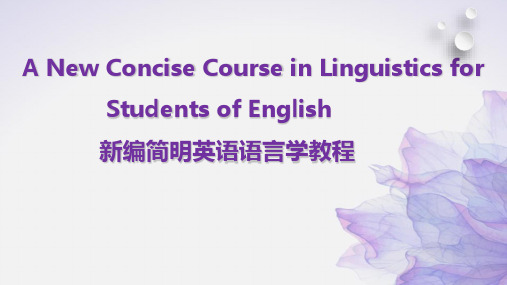
semantics(语义学)--the study of the meaning of language pragmatics(语用学)-- the study of meaning in the context of
language use.
The scopes of linguistics
sociolinguistics(社会语言学)-- how social factors affect language use psycholinguistics(心理语言学)-- linguistics behavior and
morphology(形态学)--the study of the way in which morphemes are arranged and combined to form words (the form of words)
syntax(句法学 )--the study of the rules that govern the combination of words to form grammatically permissible sentence
学前儿童语言学教案课件

学前儿童语言学教案课件第一章:绪论1.1 课程介绍理解学前儿童语言学的重要性和必要性掌握课程的目标和内容1.2 学前儿童语言发展的基本概念了解儿童语言发展的阶段和特点理解儿童语言发展的影响因素第二章:儿童语言发展的理论基础2.1 行为主义理论学习儿童语言发展的行为主义理论掌握行为主义理论在儿童语言教育中的应用2.2 认知发展理论学习儿童语言发展的认知发展理论掌握认知发展理论在儿童语言教育中的应用第三章:儿童语言发展的阶段和特点3.1 儿童语言发展的阶段学习儿童语言发展的不同阶段理解每个阶段的特点和重要性3.2 儿童语言发展的特点学习儿童语言发展的特点掌握如何观察和评估儿童语言发展的特点第四章:儿童语言发展的影响因素4.1 生物学因素学习儿童语言发展的生物学因素掌握生物学因素对儿童语言发展的影响4.2 环境和社会因素学习儿童语言发展的环境和社会因素掌握环境和社会因素对儿童语言发展的影响第五章:儿童语言教育的原则和方法5.1 儿童语言教育的原则学习儿童语言教育的原则掌握如何将原则应用到儿童语言教育实践中5.2 儿童语言教育的方法学习儿童语言教育的方法掌握如何选择和应用适合儿童语言发展的教育方法第六章:儿童语言发展的评估和观察6.1 儿童语言发展的评估方法学习儿童语言发展的评估方法掌握如何进行有效的儿童语言评估6.2 儿童语言发展的观察技巧学习儿童语言发展的观察技巧掌握如何观察和记录儿童语言发展情况第七章:语言刺激和语言环境的设计7.1 语言刺激的设计学习如何设计有效的语言刺激掌握如何创造丰富的语言学习环境7.2 语言环境的设计学习如何设计有利于儿童语言发展的环境掌握如何利用环境促进儿童语言发展第八章:语言教育和教学活动8.1 语言教育和教学活动的重要性理解语言教育和教学活动对儿童语言发展的重要性掌握设计有效的语言教学活动的方法8.2 语言教学活动的设计和实施学习如何设计和实施语言教学活动掌握如何评估和反馈语言教学活动的效果第九章:特殊需求儿童的语言教育9.1 特殊需求儿童的语言特点了解特殊需求儿童的语言特点掌握如何适应特殊需求儿童的语言教育9.2 特殊需求儿童的语言教育策略学习特殊需求儿童的语言教育策略掌握如何为特殊需求儿童提供有效的语言教育第十章:家长和教师的角色10.1 家长在儿童语言发展中的角色理解家长在儿童语言发展中的重要性掌握如何与家长合作促进儿童语言发展10.2 教师在儿童语言教育中的角色理解教师在儿童语言教育中的重要性掌握如何成为一名优秀的儿童语言教师重点和难点解析1. 儿童语言发展的基本概念:理解儿童语言发展的阶段和特点,以及影响因素。
《普通语言学》教案
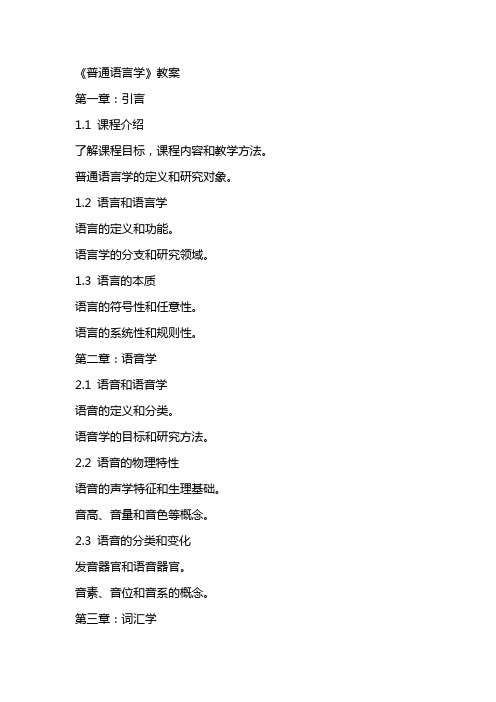
《普通语言学》教案第一章:引言1.1 课程介绍了解课程目标,课程内容和教学方法。
普通语言学的定义和研究对象。
1.2 语言和语言学语言的定义和功能。
语言学的分支和研究领域。
1.3 语言的本质语言的符号性和任意性。
语言的系统性和规则性。
第二章:语音学2.1 语音和语音学语音的定义和分类。
语音学的目标和研究方法。
2.2 语音的物理特性语音的声学特征和生理基础。
音高、音量和音色等概念。
2.3 语音的分类和变化发音器官和语音器官。
音素、音位和音系的概念。
第三章:词汇学3.1 词汇和词汇学词汇的定义和功能。
词汇学的目标和研究方法。
3.2 词汇的构成和变化词根、前缀和后缀等概念。
派生、复合和转类等词汇变化方式。
3.3 词汇的语义关系词义、词义场和词义网的概念。
词义的变化和语义场的研究方法。
第四章:语法学4.1 语法和语法学语法的定义和功能。
语法学的目标和研究方法。
4.2 句法和语义句子结构的基本成分和句型。
词汇和句子的语义关系。
4.3 语法的变化和语法化语法规则的演变和变化。
语法化的概念和例子。
第五章:语用学5.1 语用学和语用学理论语用学的定义和研究对象。
言语行为理论、会话含义理论和礼貌原则等基本理论。
5.2 语言使用和语境语境的概念和分类。
语言使用的情境和语境对语义的影响。
5.3 语言理解和语言交际语言理解的过程和机制。
语言交际的策略和技巧。
第六章:语义学6.1 语义学和语义研究语义学的定义和研究方法。
词汇语义学和句子语义学的研究内容。
6.2 词义关系和语义场上下义关系、同义关系和反义关系。
语义场的概念和构建方法。
6.3 语义的组合和聚合语义组合的原则和过程。
语义聚合的分类和特点。
第七章:社会语言学7.1 社会语言学和语言变异社会语言学的定义和研究对象。
语言变异的类型和原因。
7.2 语言态度和语言身份语言态度的形成和影响因素。
语言身份的概念和建构。
7.3 语言变异和社会阶层社会阶层对语言变异的影响。
语言变异和阶层划分的关联。
语言学理论与流派教案大纲
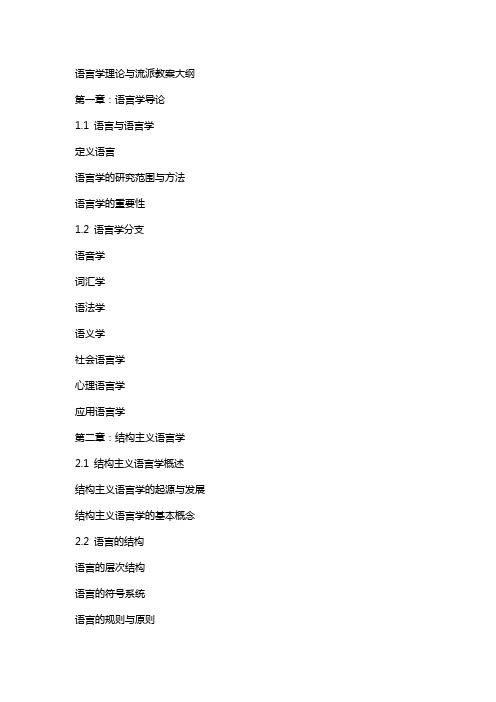
语言学理论与流派教案大纲第一章:语言学导论1.1 语言与语言学定义语言语言学的研究范围与方法语言学的重要性1.2 语言学分支语音学词汇学语法学语义学社会语言学心理语言学应用语言学第二章:结构主义语言学2.1 结构主义语言学概述结构主义语言学的起源与发展结构主义语言学的基本概念2.2 语言的结构语言的层次结构语言的符号系统语言的规则与原则2.3 结构主义语言学代表人物费尔迪南·德·索绪尔鲁思·哈里森克劳德·列维-斯特劳斯第三章:功能主义语言学3.1 功能主义语言学概述功能主义语言学的起源与发展功能主义语言学的基本概念3.2 语言的功能交际功能表达功能认知功能3.3 功能主义语言学代表人物罗杰·费尔盾迈克尔·阿诺德约翰·菲尔莫尔第四章:转换语言学4.1 转换语言学概述转换语言学的起源与发展转换语言学的基本概念4.2 语言的能力短语结构规则转换规则词汇规则4.3 转换语言学代表人物诺姆·乔姆斯基约翰·霍奇金森马克·拉宾纳第五章:认知语言学5.1 认知语言学概述认知语言学的起源与发展认知语言学的基本概念5.2 认知语言学的理论基础认知心理学语言习得理论概念结构理论5.3 认知语言学代表人物乔治·莱考夫约翰·泰勒尤里·施密特第六章:语用学与交际语言学6.1 语用学概述语用学的定义与研究范围语用学的重要性与实际应用6.2 交际语言学的基本理论交际语言学的起源与发展语言交际的过程与要素6.3 语用学与交际语言学的代表人物约翰·范德·沃尔赫伯特·帕克塞尔玛·舍尔第七章:社会语言学7.1 社会语言学概述社会语言学的起源与发展社会语言学的基本概念7.2 社会语言学的主要理论言语社区理论语言态度与身份认同语言变异与变化7.3 社会语言学的代表人物丹尼尔·朱克拉里·阿尔德海德珍妮特·费尔第八章:心理语言学8.1 心理语言学概述心理语言学的起源与发展心理语言学的基本概念8.2 语言的认知过程语言的理解与产生语言的习得与遗忘语言与思维的关系8.3 心理语言学的代表人物乔治·米勒认知心理学与语言斯蒂芬·平克第九章:应用语言学9.1 应用语言学概述应用语言学的定义与研究范围应用语言学的重要性与实际应用9.2 语言教学理论与方法直接法视听法交际法9.3 应用语言学的代表人物约瑟夫·奥尔曼斯蒂芬·克拉森罗杰·天使第十章:语言学发展趋势与展望10.1 语言学的发展趋势跨学科研究语言学与技术的结合全球化背景下的语言学10.2 语言学的重要性与挑战语言学在现代社会的作用语言学面临的挑战与应对策略10.3 语言学未来的发展方向探索人类语言能力语言学与其他领域的融合促进语言学的普及与教育重点和难点解析重点环节一:语言与语言学语言的定义:语言是人类交流与思维的重要工具,是一种系统化的符号活动。
语言学纲要教案-第一章语言的社会功能

【教学目的要求】认识语言的社会功能,理解语言是人类最重要的交际工具及其在社会生活中的重要作用,了解语言与思维的关系。
第一节语言是人类最重要的交际工具。
★一、语言和言语“语言”和“言语”的区分问题是索绪尔首先明确提出来的,他称之为“建立言语活动理论的第一条分叉路。
”这就是说要研究语言学,第一件要作的事就是把语言和言语区分开。
1.什么是语言?对于语言,学术界其实还没有一个统一的界定,我们这里是这样界定语言这个概念的:语言是一种特殊的社会现象,它作为人类最重要的交际工具为全社会服务,它同人的思维有密切的联系,是人区别于其他动物的的本质特征之一,语言是音义结合的符号系统。
语言的特征语言是一种特殊的社会现象,这是语言的本质特征。
语言是人类最重要的交际工具,是思维的工具,这是语言的功能特征。
语言的功能特征除了是最重要的交际工具之外,还有人类必不可少思维工具。
语言是音义结合的符号系统,这是语言的结构特征。
本质特征:一种特殊的社会现象;语言功能特征:思维工具,交际工具;结构特征:音义结合的符号系统。
语言的构成语言的构成要素有三:语音、词汇、语法。
语音是语言的物质外壳,也是词汇、语法的表现形式。
词汇是语言的材料,语法是语言的结构规律,是语言材料的组织方式。
语言三要素(也有人认为四要素:语音、语义、词汇、语法)中最主要的是语法和基本词汇,二者构成语言的基础。
2.什么是言语?言语是人们为了某种目的,在特定条件下发生的说话行为和说出来的话。
这里的“说话行为”是指说话的动作和过程;“说出来的话”是指一连串有意义的声音。
语言和言语的关系语言和言语的区别(1)语言是社会的,而言语是个人的。
(2)语言是抽象的,而言语是具体的。
语言结构要素的各单位及其规则是有限的,而言语却不然,按照语法规则,利用有限的语言材料可以造出数不清的句子。
如“这是猫”。
“这是我家的猫”。
“这是我家邻居的猫”。
……(3)语言没有阶级性,而言语却是有阶级性的。
《语言学概论教案》课件

《语言学概论教案》课件第一章:语言与语言学1.1 语言的定义与特征引导学生理解语言是一种符号系统,用于人类交流和思维。
讨论语言的普遍特征,如创造性、结构性、渐变性和文化性。
1.2 语言学的学科定位与研究方法介绍语言学的定义和研究范围,强调其跨学科性。
探讨语言学的研究方法,包括描写性方法和解释性方法。
第二章:语言的本质2.1 语言与思维讨论语言与思维的关系,探讨语言如何影响我们的认知和思维方式。
分析不同语言对思维方式的影响,如语序和语法结构对认知的影响。
2.2 语言与现实探讨语言如何构建我们对现实的理解,包括概念化和范畴化。
分析语言如何反映社会现实和文化差异。
第三章:语言的结构3.1 语音与音系介绍语音学的基本概念,如音素、音位和音标。
探讨音系学的原理,如音节、韵律和声调。
3.2 词汇与词义讨论词汇学的核心概念,如词汇、词根和词缀。
分析词义的性质和变化,包括词义的关系和词义的演变。
第四章:语言的使用4.1 语言与语境介绍语境的概念,包括语言语境和非语言语境。
探讨语境如何影响语言的理解和产生。
4.2 语言与交流分析语言在交流中的作用,包括信息的传递和人际关系的建立。
探讨语言交流的障碍和策略。
第五章:语言的变体5.1 方言与地域方言讨论方言的定义和分类,分析地域方言的形成和变化。
5.2 社会方言与语言变异探讨社会方言的概念,包括阶级方言、性别方言和年龄方言。
分析语言变异的原因和影响。
第六章:语言的演变6.1 语言演变的过程介绍语言演变的概念和原因,包括内在因素和外部因素。
探讨语言演变的主要类型,如语音变化、形态变化和句法变化。
6.2 历史语言学与语言演变介绍历史语言学的研究对象和方法。
分析具体的历史语言演变案例,如印欧语系的发展和汉语的历史演变。
第七章:语言的接触7.1 语言接触的概念与类型讨论语言接触的定义和意义,包括语言借贷和语言替换。
分析语言接触的类型,如双语现象、语言融合和语言转用。
7.2 语言接触的影响与后果探讨语言接触对语言结构的影响,如语音、词汇和语法的影响。
简明新编英语语言学教程教案
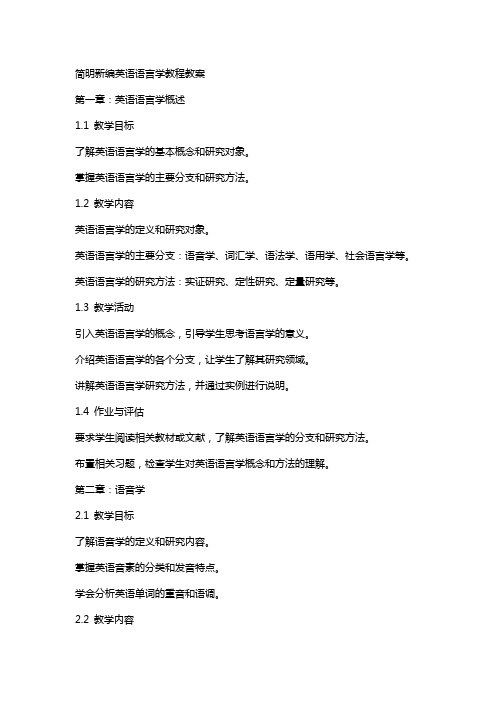
简明新编英语语言学教程教案第一章:英语语言学概述1.1 教学目标了解英语语言学的基本概念和研究对象。
掌握英语语言学的主要分支和研究方法。
1.2 教学内容英语语言学的定义和研究对象。
英语语言学的主要分支:语音学、词汇学、语法学、语用学、社会语言学等。
英语语言学的研究方法:实证研究、定性研究、定量研究等。
1.3 教学活动引入英语语言学的概念,引导学生思考语言学的意义。
介绍英语语言学的各个分支,让学生了解其研究领域。
讲解英语语言学研究方法,并通过实例进行说明。
1.4 作业与评估要求学生阅读相关教材或文献,了解英语语言学的分支和研究方法。
布置相关习题,检查学生对英语语言学概念和方法的理解。
第二章:语音学2.1 教学目标了解语音学的定义和研究内容。
掌握英语音素的分类和发音特点。
学会分析英语单词的重音和语调。
2.2 教学内容语音学的定义和研究内容。
英语音素的分类:元音、辅音、半元音等。
英语单词的重音和语调。
2.3 教学活动引入语音学的概念,引导学生了解其重要性。
讲解英语音素的分类和发音特点,通过示例进行演示。
分析英语单词的重音和语调,让学生进行实践。
2.4 作业与评估要求学生阅读相关教材或文献,了解语音学的相关知识。
布置相关习题,检查学生对英语音素分类和发音特点的理解。
让学生录制英语单词的重音和语调,进行自我评估。
第三章:词汇学3.1 教学目标了解词汇学的定义和研究内容。
掌握英语词汇的分类和构成方式。
学会分析英语词汇的语义关系和语用功能。
3.2 教学内容词汇学的定义和研究内容。
英语词汇的分类:名词、动词、形容词等。
英语词汇的构成方式:派生、合成、转化等。
英语词汇的语义关系和语用功能。
3.3 教学活动引入词汇学的概念,引导学生了解其重要性。
讲解英语词汇的分类和构成方式,通过示例进行演示。
分析英语词汇的语义关系和语用功能,让学生进行实践。
3.4 作业与评估要求学生阅读相关教材或文献,了解词汇学的相关知识。
布置相关习题,检查学生对英语词汇分类和构成方式的理解。
英语语言学教案
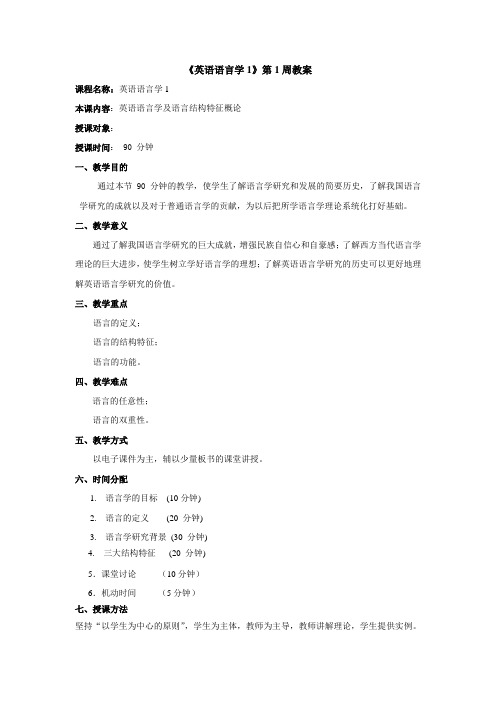
《英语语言学1》第1周教案
课程名称:英语语言学1
本课内容:英语语言学及语言结构特征概论
授课对象:
授课时间: 90 分钟
一、教学目的
通过本节 90 分钟的教学,使学生了解语言学研究和发展的简要历史,了解我国语言学研究的成就以及对于普通语言学的贡献,为以后把所学语言学理论系统化打好基础。
二、教学意义
通过了解我国语言学研究的巨大成就,增强民族自信心和自豪感;了解西方当代语言学理论的巨大进步,使学生树立学好语言学的理想;了解英语语言学研究的历史可以更好地理解英语语言学研究的价值。
三、教学重点
语言的定义;
语言的结构特征;
语言的功能。
四、教学难点
语言的任意性;
语言的双重性。
五、教学方式
以电子课件为主,辅以少量板书的课堂讲授。
六、时间分配
1. 语言学的目标(10分钟)
2. 语言的定义(20 分钟)
3. 语言学研究背景(30 分钟)
4. 三大结构特征(20 分钟)
5.课堂讨论(10分钟)
6.机动时间(5分钟)
七、授课方法
坚持“以学生为中心的原则”,学生为主体,教师为主导,教师讲解理论,学生提供实例。
八、作业
复习第1章1.1-1.2小节,预习1..3-1.5。
- 1、下载文档前请自行甄别文档内容的完整性,平台不提供额外的编辑、内容补充、找答案等附加服务。
- 2、"仅部分预览"的文档,不可在线预览部分如存在完整性等问题,可反馈申请退款(可完整预览的文档不适用该条件!)。
- 3、如文档侵犯您的权益,请联系客服反馈,我们会尽快为您处理(人工客服工作时间:9:00-18:30)。
一.1.How is Sausure’s distinction between langue and parole similar to Chomsky’s dintinction between competence and performance?Sausure made a distinction between langue and parol. According to Sausure, Language refers to the abstract linguistic system shared by all the members of a speech community; Parol refers to the realization of language in actual use. As a social product, language is a set of convention, or generalized rules of a language that members of a speech community seem to abide by. Parol, on the other hand, is the concrete use of the conventions or application of the rules. Langue is abstract, parol is specific to a situation; Langue is not actually spoken by anyone, parol is always a naturally occuring event; Langue is relatively stable and systematic, parol is subject to personal and situational constrains. What a linguist has to do is to discover the regularities govering all instances of parole and langue. This distinction is very importaant and far-influential.Similar to the distinction between langue and parole is the distinction between competence and performance made by Chomsky in the 1950s. Competence is the ideal user’s knowledge of the rules of his language. Performance is the actual realization of this knowledge in speech. A speaker’s compentence is stable but his performance is often inflenced by psychological and social factors. Such as pressure, distress, anxiety, etc. Compentence enables a speaker to produce and understand an infinite number of sentences, but his performance does not always match his compentence.Chomsky’s competence is similar to Sausure’s langue, performance is similar to parole, and both of them holding that language consists of specific realizations and abstract underlying linguistic rules. Sausure thinks that langue should be the subject of linguistics, and Chomsky also agrees that the focus of linguistics should be the ideal user’s competence, not his performance. However, Sausure looks at language more from a sociological perspective while Chomsky looks at it more a psychological perspective.2.Linguistic potential and actual linguistic behaviourHalliday made the distinction between linguistic potential and actual linguistic behaviour in the 1960s. Halliday looks at language from a functional point of view; he is more concerned with what speakers do with language. With language, there is a wide range of things a speaker can do in the culture he is in. His linguistic potentialis is similar to Sausure’s langue and Chomsky’s competence. and his actual linguistic behaviour is similar to the notions of parole and performance. Among the distinctions, parole, performance and actual linguistic behaviour have a lot in common; but langue, competence and linguistic potential differ considerably. They are similar only in one aspect, that is, they all refer to the constant which underlies the utterances that constitute parole/performance/actual behaviour. Their differenc is fairly obvious. Langue is a social property while linguistic potential something available for the speaker to select from. Competence is a form of “knowing”while linguistic potential is a set of possibilities for “doing”. The competence versus performance distinction is one between what a person “knows” and what he “does”, while the linguistic potentialversus actual linguistic behaviour distinction is one between what a person “can do”and what a person “does”.二.Terms1.Phonetics(语音学) :It is the branch of liguistics which studies the characteristics of speech sounds and provides methods for their description, classification and transcription.2.Phonology(音系/音位学):It is the branch of liguistics which studies how sounds are put together and used to convey meaning in communication.3.Morphology(形态学):It is the branch of liguistics which studies how the smallest meaningful units in a language are arranged to form words.4.Syntax(句法学):The word combination is rule-governed, the study of these rules is called syntax as a major branch of linguistics.5.Semantics(语义学): The study of meaning of language is known as semantics.6.Pragmatics(语用学):The branch of liguistics which studies the meaning in the context of use is called pragmatics.7.Psycholinguistics(心理语言学):It is the interdisciplinary study which examines the relationship between language and human brain.8.Sociolinguistics(社会语言学):It is the interdisciplinary study of the relationship between language use and the structure of society.9.Anthropological linguistics(人类语言学):It is the investigation that uses the theories and methods of anthropology to study language variation and language use in relation to human cultural patterns and beliefs.putational linguistics(计算机语言学):As a branch of communications engineerings, it is the use of computers and computer techniques to further linguistics research and specific problem solving.11.Neurolinguistics(神经语言学): It is the branch of liguistics concerned in principle with the physical representation of language or linguistic processes in the brain.12.General linguistics(普通语言学):The study of language as a whole is often called General linguistics.13.Synchronic linguistics(共时语言学):The description of a language at some point in time is a synchronic study, also called synchronic linguistics.14.Diachronic linguistics(历时语言学):The description of a language as it changes through time is a diachronic study, also called diachronic linguistics.15.Macrolinguistics(宏观语言学):Linguistics is not the only field concerned with language,other disciplines (学科)are also preoccupied with language.16.Descriptive or prescriptive(描写式和规定式):A linguistics study is Descriptive if it describes and analyses facts observed. It is Prescriptive if it tries to lay down rules for “correct” behaviour.17.Etic(唯素的):Refers to the linguistic units containing “-etic”, for instance, phonetic, morphetic, which are used to describe linguistic facts in detail without distinctive features, are first used to describe sounds.18.Emic(唯位的): :Refers to the linguistic units containing “-emic”, for instance, phonemic, morphemic, which are used to describe abstract linguistic rules with distinctive features, are first used to describe phonemes.。
